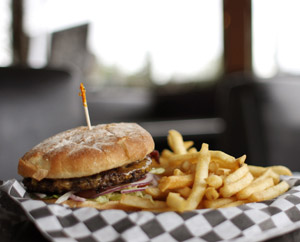Gluten Free
What does following a gluten-free diet mean? That you're embarking on an easy diet with a wide range of health-promoting effects. Instead of dwelling on what you’re giving up, consider that you’re going to enjoy a whole new world of delicious food options to meet your special dietary needs. You’ll be eating seasonally, choosing more fresh fruits and vegetables, focusing on meats, seafood, poultry, legumes, lentils, corn, and rice, and discovering fascinating ancient grains such as quinoa, amaranth, and millet. You’ll be able to eat potatoes, eggs, most cheeses, even chocolate (!)—and enjoy them without guilt because you’ll be taking good care of your body. In fact, you’ll probably end up eating—and feeling—better than ever!
Visit this page for more information about living Gluten Free
---
We carry a large variety of gluten free items, the brands listed below represent just some of the offerings we carry















More Diets
- By Kimberly Beauchamp, ND
Junk Food Is Bad for Your Mood
Eating fast food and processed pastries could increase the risk of depression, according to a study in Public Health Nutrition.
People who ate the most fast food were 36% more likely to develop depression than those who ate the least
More than just sad
Everyone goes through ups and downs. But being sad is very different than being depressed. Whereas sadness can lift when your situation changes, depression comes with a host of symptoms that may stick around for months or even years, long after the event that may have triggered it.
Depression symptoms can vary widely, and it’s sometimes hard for a depressed person to distinguish between everyday feelings and a clinical condition. People with depression may be more tired than usual, have decreased libido, an increased or decreased appetite, difficulty concentrating, and a loss in interest in activities that used to be pleasurable.
What can diet do?
Omega-3 fatty acids found in cold water fish can help ease depression in some people, and getting enough B vitamins can help correct deficiencies that may contribute to depression. But not as much is known about the role of certain types of food, especially less nutritious foods, on mood and well-being.
A Spanish study including 8,964 people looked at the connection between eating junk food and the chances of developing depression. The people reported on how often they ate fast foods—including hamburgers, pizza, and sausages—and processed pastries including muffins, doughnuts, and croissants.
Over the course of six years, researchers noted how many people developed depression. Here’s what they found:
- People who ate the most fast food were 36% more likely to develop depression than those who ate the least.
- Eating more processed pastries increased the risk of depression by 38%.
This information joins a growing body of evidence tying inflammation in the body to depression risk. Processed foods may also increase cardiovascular disease risk and markers of inflammation in the body. The authors suggested that inflammation might be partially responsible for the increase in depression risk seen in the study.
“Public health nutrition policies should take into account the detrimental effects of these kinds of products not only on cardiovascular disease and its related risk factors but also on mental health,” commented lead study author, Almudena Sanchez-Villegas.Eat to beat depression
In addition to bypassing junk food, these healthy eating habits may help you sidestep depression:
- Get enough protein. The amino acids in protein-rich foods are the building blocks for many “happy” chemicals in the brain. Focus on fish, lean meats, eggs, and legumes.
- Control inflammation. Eating plenty of fresh vegetables, fruits, and whole grains helps keep inflammation at bay and decreases your risk of depression.
- Eat healthy fats. Salmon, avocado, olive oil, and nuts are all loaded with good-for-you fats. Avoid synthetic trans fats found in many processed foods.
- Get your Bs: Folic acid, vitamin B6, and vitamin B12 all play a role in maintaining a healthy mood. Black-eyed peas, broccoli, shellfish, tuna, lamb, lean beef, and yogurt are all rich sources of B vitamins.
(Public Health Nutr 2012;doi:10.1017/S1368980011001856)












